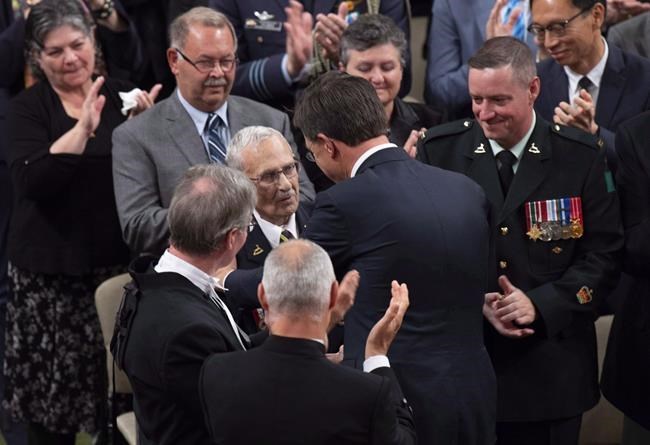
Prime Minister of the Netherlands Mark Rutte speaks with Royal Canadian Dragoons veteran Donald White, who helped liberate Holland, after speaking to the House of Commons in Ottawa, Thursday, October 25, 2018. THE CANADIAN PRESS/Adrian Wyld
April 14, 2020 - 2:00 AM
OTTAWA - Donald White was shaving when his friend ran in excitedly to tell his unit the news: The war was over.
The evening of May 8, 1945, White and his fellow Royal Canadian Dragoons were parked at a bivouac about 30 kilometres from the German port city of Wilhelmshaven. Canada had been at war with Nazi Germany for nearly six years. And now his friend was saying that the BBC was reporting on the wireless radio in their Staghound armoured car that the war was over?
"We thought he was just pulling our legs," the now-95-year-old White recalls in an interview from his home in Oshawa, Ont. "I was shaving and I was going to drown him in the shaving water for being a smartass. It was maybe five minutes later the officer came in and informed us."
White was supposed to have been in the Netherlands this week, a guest of honour in a commemoration of the Dragoons' role in liberating the Dutch city of Leeuwarden exactly 75 years ago on April 15. The trip was to be first of two to the Netherlands, the second planned for early next month to mark Canada's role in liberating the country.
Instead, White is home in suburban Toronto. Having already devastated lives and livelihoods around the world, COVID-19 is also affecting remembrance efforts by forcing the cancellations of key commemorative events such as the 75th anniversaries of the Liberation of the Netherlands and Victory in Europe Day, when Nazi Germany surrendered to the Allies.
"I feel disappointed like everybody," White said. "We planned for it and looked forward to it and I think probably my biggest disappointment was not only the celebrations, but I've gotten to know people over there. It's like going to meet old friends."
The federal government was planning to send a large delegation of veterans, family members, current military members and students to the Netherlands for 10 days at the start of May for the two commemorations, but those have since been postponed indefinitely. Other commemorations such as for the Battle of the Atlantic have also been put on hold or cancelled for this year.
"The well-being of veterans and staff is of utmost importance," Veterans Affairs Canada said in a recent statement. "In line with advice about the novel coronavirus (COVID-19) from various health and safety authorities, the government of Canada will not be sending a delegation overseas and will not be hosting commemorative ceremonies in the Netherlands as planned."
The Department of National Defence sent out its own message this month to active service personnel who were preparing to head to the Netherlands for the events to stand down and focus on preparing to respond to calls for help for COVID-19, a natural disaster or both at once.
The First Canadian Army was responsible for clearing the Netherlands of German forces in the final weeks of the war. The effort is largely overshadowed in Canada by D-Day and other major Second World War battles, but more than 1,300 Canadians were killed and 4,300 were wounded during weeks of grinding fighting as the Germans were pushed back.
In the process, the Canadians saved up to a million Dutch from starvation and sickness, says historian Mark Zuehlke, who wrote a book entitled "On to Victory: The Canadian Liberation of the Netherlands, March 23-May 5, 1945," and the Canadians earned the Netherlands' undying gratitude.
The European country has sent tulips — 1.1 million last year — to Canada each year since the war and hosted parades to honour the Canadians who were there. The country has also typically played host to Canada during V-E Day commemorations, which was followed by the surrender of Japan in August 1945, formally ending the Second World War. Prime Minister Justin Trudeau was expected to attend this year's event.
White has previously met Dutch Prime Minister Mark Rutte and Princess Margriet, who was born in Ottawa in 1943 where the Dutch royal family was staying in exile, at previous commemorations in the Netherlands. This year, his three children were planning to attend with him. Veterans Affairs is still planning to send a delegation of veterans to the Netherlands once the pandemic passes. But when that will be is anyone's guess.
"How does anybody plan anything until we know when we're going to be able to deal with this problem we have right now, this infection?" White said.
Zuehlke was working with Veterans Affairs Canada to organize several tours of the Netherlands for Canadians during the commemorations before they were cancelled and said he expects the events to be postponed to next year. Some of the elderly veterans who had planned to go this year won't be able to make it.
Still, despite his disappointment at not going, White could also see some similarities in how a crisis — whether a world war or a pandemic — can engender faith while bringing a country and society together to face it.
"It's terrible what's going on and we're being inconvenienced and that, but I think we gotta do what we're told we're supposed to do, hoping for the best," he said. "And that's probably like we did during the war. We hoped for the best, right?"
This report by The Canadian Press was first published April 14, 2020.
News from © The Canadian Press, 2020